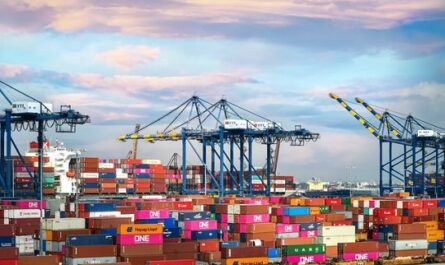In today’s ever-evolving business environment, making sure goods move seamlessly from production to consumers relies heavily on efficient warehouse management and logistics.
As businesses aim to enhance their supply chain, a key choice surfaces: should they handle warehouse operations in-house or tap into the knowledge of third-party logistics (3PL) providers?
This guide will delve into the ten essential factors businesses should weigh before deciding on this strategic move.
Before we go further into this topic, don’t forget to follow my LinkedIn account. You’ll get more helpful insights on supply chain management there.
Table of Contents
Cost Analysis: The Bottom Line Matters
When deciding between managing your warehouse in-house or opting for 3PL services, a crucial aspect to consider is the cost analysis, delving into the financial implications for your business.
Setting up an in-house warehouse involves a substantial initial investment, covering expenses like facility leasing or construction, hiring and maintaining a skilled workforce, acquiring specialized equipment, and establishing a robust technology infrastructure, including warehouse management systems.
This comprehensive investment can be particularly burdensome for smaller or growing businesses, straining their financial resources.
On the flip side, 3PL services offer an appealing alternative by spreading expenses across multiple clients. This distribution of costs enables businesses to enjoy economies of scale, tapping into the efficiency and cost-effectiveness that come with the larger scale of 3PL providers. This allows companies to access advanced logistics capabilities without shouldering the entire burden of infrastructure and operational expenses, making 3PL services a more economical option.
However, it’s vital for businesses to conduct a nuanced cost-benefit analysis, considering not only the immediate financial outlay but also the long-term implications.
While 3PL services may provide initial cost savings, companies need to weigh these against potential future increases in service fees or the cost of relinquishing control over certain aspects of their operations.

Moreover, the specific demands and growth trajectories of each business must be taken into account, as the cost-effectiveness of 3PL services may vary based on factors like fluctuations in order volume, market expansion, and the need for specialized logistics solutions.
In essence, gaining a comprehensive understanding of the cost dynamics associated with both in-house and 3PL options is crucial for businesses to make a well-informed decision aligned with their financial goals and overall strategic vision.
Scalability: Adapting to Changing Demands
When deciding between managing your warehouse in-house or opting for 3PL services, scalability emerges as a crucial factor, especially for businesses operating in industries with variable or seasonal demand patterns.
In-house operations face challenges in adapting quickly to fluctuating order volumes. During periods of low demand, businesses may grapple with underutilized resources, such as excess storage space, idle labor, and equipment, leading to increased operational costs and decreased overall efficiency.
On the flip side, during peak seasons or promotions, in-house operations may struggle to scale up rapidly, resulting in bottlenecks, delayed order fulfillment, and potential impacts on customer satisfaction. These limitations become particularly evident in industries characterized by dynamic market conditions and unpredictable consumer behaviors.
In contrast, 3PL providers offer a solution tailored to the dynamic nature of modern supply chains. Drawing on their expertise and expansive networks, 3PL services provide businesses with scalable solutions that efficiently accommodate fluctuations in demand.
With strategically located distribution centers, these providers optimize transportation and reduce lead times, allowing for a more agile response to changing market conditions.
Additionally, 3PL providers can offer shared resources and workforce flexibility, enabling businesses to scale up or down quickly based on demand while mitigating the risks associated with underutilized capacity or operational bottlenecks.
Therefore, the scalability advantage provided by 3PL services is a compelling factor for businesses looking to enhance their responsiveness to market dynamics and ensure optimal resource utilization throughout the entire supply chain.
You might also like:
- How to Choose the Perfect 3PL Provider for Your Business: A Comprehensive Guide
- Common Logistics Trade-Offs and How to Make the Right Decisions
Expertise and Specialization: Accessing Specialized Knowledge
Efficient warehouse management is a complex task that demands a diverse set of skills and expertise. From maintaining the right inventory levels to ensuring smooth order fulfillment, businesses need to navigate various intricacies to uphold operational efficiency.
Third-party logistics (3PL) providers, with their specialized focus on logistics, bring a wealth of industry-specific knowledge to the table. Typically, they have teams of professionals well-versed in the nuances of warehouse management, leveraging their experience to implement best practices and optimize processes.

By outsourcing to a 3PL, businesses can tap into this expertise without the need to build an in-house team from the ground up, saving both time and resources. This is especially advantageous for companies entering new markets or expanding their product lines, as they can leverage the 3PL’s existing knowledge base to navigate challenges associated with different industries and supply chain complexities.
When deciding between in-house warehouse management and 3PL services, it’s crucial to assess the complexity of your supply chain. A nuanced understanding of the intricacies in your specific industry, ranging from regulatory compliance to order fulfillment nuances, is essential for making an informed decision.
If your supply chain involves specialized requirements, such as temperature-sensitive products or intricate handling protocols, the specialized knowledge offered by 3PL providers can be instrumental in ensuring that your operations meet industry standards.
The decision ultimately depends on a careful evaluation of the expertise needed to navigate your unique supply chain challenges and whether your business is better suited to build and sustain an in-house team or leverage the specialized knowledge and experience of a 3PL provider to streamline warehouse management processes.
Technology Integration: Staying Ahead in a Digital Age
Efficient warehouse management and logistics now heavily rely on the integration of advanced technologies. In a time where speed and accuracy are paramount, businesses are increasingly adopting technologies such as Warehouse Management Systems (WMS) and automation to streamline their operations. These technologies offer perks like real-time inventory tracking, automated order processing, and data analytics for better decision-making.
Given their focus on logistics and supply chain management, 3PL providers often prioritize substantial investments in these technologies. This allows them to offer cutting-edge solutions that enhance efficiency, reduce errors, and provide valuable insights into supply chain processes.

For businesses contemplating in-house warehouse management, it’s crucial to thoroughly assess their technology needs and capabilities. This evaluation encompasses not only the current state of their technological infrastructure but also their ability to keep pace with ongoing advancements in the rapidly evolving logistics landscape.
Some businesses may find it challenging or cost-prohibitive to match the level of investment and expertise in technology that 3PL providers bring to the table. Consequently, outsourcing to a 3PL can be strategically advantageous, enabling businesses to leverage the technological advancements made by industry specialists and gaining access to state-of-the-art systems without bearing the full burden of development and maintenance costs.
When deciding between in-house and 3PL warehouse management, businesses must carefully consider the competitive advantages that advanced technologies can offer. 3PL providers often provide a tech-savvy ecosystem that includes not only WMS and automation but also innovations like IoT (Internet of Things) devices and data analytics. These technologies contribute not only to operational efficiency but also to improved visibility and decision-making.
Businesses evaluating their technology strategy should consider the long-term implications of their choices, as falling behind in technological advancements can hinder competitiveness.
On the other hand, outsourcing to a 3PL can be a strategic move to stay at the forefront of technological developments, as providers continuously invest in upgrading their systems to maintain a competitive edge in the market. Ultimately, the decision hinges on the alignment of a company’s technology goals with its capacity to invest and innovate, with the understanding that 3PL services may provide a technological advantage that is challenging to replicate in-house.
You might also like:
- How to Build a Reliable and Trustworthy Supply Chain Management Team: You Can Lead the Way!
- Improving Your Bottom Line: Why You Can’t Overlook the Importance of Routine Performance Reviews
Risk Management: Mitigating Operational Risks
Warehouse management involves inherent risks that businesses need to navigate for the smooth operation of their supply chains. These risks, ranging from potential inventory shrinkage due to theft or errors to compliance issues with regulations and standards, can have significant financial and operational implications.

3PL providers, specializing in logistics and supply chain management, often come prepared with established risk mitigation strategies. These strategies may include advanced security measures, thorough quality control processes, and compliance management systems.
Additionally, many 3PL providers carry comprehensive insurance coverage, providing an extra layer of protection for their clients.
By outsourcing warehouse management to a 3PL, businesses can share the responsibility for risk mitigation, benefiting from the provider’s expertise in navigating and minimizing potential challenges.
When deciding between in-house management and 3PL services, assessing and managing risks associated with warehouse operations is a critical consideration.
Businesses must conduct a thorough risk analysis, taking into account factors such as the nature of their products, the complexity of their supply chain, and the regulatory landscape in which they operate.
3PL providers often have experience dealing with various risks across different industries, providing insights into effective risk management strategies. Choosing a reputable 3PL partner allows businesses to leverage this expertise to reduce exposure to potential risks.
Furthermore, understanding the organization’s level of risk tolerance is crucial in aligning the chosen solution with the overall business strategy. While in-house operations offer a higher degree of control, they also entail the responsibility of developing and implementing robust risk management strategies. Businesses must weigh the benefits of control against the potential advantages of outsourcing to 3PL providers, who bring both experience and specialized resources to effectively address and mitigate inherent risks in warehouse management.
Geographic Reach: Navigating Global Supply Chains
For businesses with a global footprint, the geographic reach of warehouse operations becomes a crucial consideration. Managing a worldwide supply chain involves intricate coordination and efficient distribution, and this is where the extensive network of distribution centers provided by 3PL services proves highly advantageous.
3PL providers strategically position their facilities across different regions and countries, creating a network that allows businesses to store inventory closer to end consumers. This proximity minimizes shipping times and costs, ultimately enhancing overall supply chain efficiency.

The global network of distribution centers offered by 3PL providers not only facilitates quicker order fulfillment but also enables businesses to scale their operations seamlessly in response to international market demands. This strategic advantage is especially crucial for companies looking to expand their global market presence, aligning with the need for a robust and flexible logistics infrastructure to support such aspirations.
Businesses need to carefully assess their expansion plans and the alignment of in-house operations with their geographic aspirations. Establishing and managing warehouses in multiple locations around the world can be a complex and resource-intensive endeavor. In-house operations may struggle to match the global reach and efficiency of 3PL providers, particularly if they lack the necessary infrastructure, expertise, and network to navigate the intricacies of international logistics. Leveraging the established global presence of 3PL providers allows businesses to benefit from existing distribution networks, streamlined cross-border logistics, and localized expertise, facilitating a smoother entry and sustained operations in new markets.
By partnering with a 3PL provider with a robust international footprint, businesses can effectively meet the challenges of global supply chain management, ensuring that their warehouse operations align seamlessly with their expansion strategies.
Customer Satisfaction: Delivering a Seamless Experience
In today’s e-commerce landscape, where customer expectations for speedy deliveries and seamless service are higher than ever, ensuring customer satisfaction is a top priority for businesses.
The efficiency of warehouse management directly impacts order fulfillment, a critical element in shaping the overall customer experience. 3PL providers, equipped with streamlined processes and extensive distribution networks, give businesses a strategic advantage in not only meeting but exceeding customer expectations.
The speed and precision with which orders are processed and delivered are crucial factors influencing customer satisfaction. 3PL providers, leveraging their logistics expertise and optimized warehouse operations, play a significant role in minimizing order processing times, reducing shipping costs, and ensuring timely and accurate deliveries.

By tapping into the capabilities of 3PL services, businesses can enhance their ability to meet the demands of today’s consumers, fostering positive experiences that contribute to brand loyalty and positive word-of-mouth marketing.
As businesses contemplate the decision between in-house warehouse management and outsourcing to 3PL providers, evaluating the impact on customer satisfaction and brand reputation becomes a crucial aspect of the decision-making process.
In-house operations may encounter challenges in achieving the same level of efficiency and responsiveness as experienced 3PL providers. Delays in order fulfillment, inaccuracies in shipments, or difficulties in adapting to peak demand periods can potentially lead to dissatisfied customers and negatively impact brand reputation.
On the flip side, 3PL providers, with their established processes and distribution networks, are better positioned to navigate the complexities of modern e-commerce, providing businesses with a competitive edge in delivering a superior customer experience.
Ultimately, businesses must carefully assess how their choice in warehouse management aligns with their commitment to customer satisfaction, recognizing the pivotal role that efficient logistics operations play in shaping the perceptions and loyalty of today’s discerning consumers.
You might also like:
- Are You Maximizing Efficiency in Managing Products with Short Shelf Life?
- Shipping Gone Wrong? Find Out How You Can Quickly Resolve the Issue
Regulatory Compliance: Navigating a Complex Landscape
The logistics industry operates within a complex regulatory environment, encompassing a multitude of standards and requirements, from safety protocols to customs regulations. Complying with this intricate web of rules poses a significant challenge for businesses involved in supply chain management. Non-compliance not only jeopardizes the integrity of the supply chain but can also lead to severe penalties and legal consequences.
Recognizing the complexity of this regulatory landscape, many 3PL providers invest in dedicated teams of professionals with expertise in navigating and ensuring adherence to the ever-evolving regulations. These teams stay informed about changes in local, national, and international regulations, providing businesses with a level of regulatory expertise that may be challenging to replicate with in-house resources alone.

By outsourcing to 3PL providers, businesses can mitigate the risks associated with compliance, as these experts work proactively to ensure that all aspects of the supply chain, from transportation to customs documentation, align with the necessary guidelines.
When deciding whether to manage compliance in-house or leverage the expertise of 3PL providers, businesses should carefully assess their internal capabilities and resources. The ability to remain compliant involves not only understanding current regulations but also adapting swiftly to changes in the regulatory landscape.
In-house teams may find it challenging to keep pace with the dynamic nature of these requirements, especially if the business operates in multiple jurisdictions. Outsourcing compliance responsibilities to 3PL providers allows businesses to tap into a specialized skill set, ensuring that their supply chain activities consistently align with regulatory standards.
This strategic approach not only mitigates the risk of non-compliance but also frees up internal resources, enabling businesses to focus on core competencies and strategic growth initiatives while leaving the intricate details of regulatory adherence to the experts.
Control and Visibility: Balancing Autonomy and Oversight
Choosing between in-house warehouse management and 3PL services involves finding the right balance between the desired level of control and operational efficiency for businesses.
In-house operations offer a higher degree of control, allowing businesses to take a hands-on approach to every aspect of their supply chain. This control extends from selecting technology systems to hiring and managing staff and implementing customized processes.
However, this autonomy comes with a cost, requiring substantial oversight and ongoing investments in infrastructure and personnel. The in-house model demands meticulous attention to detail, making it suitable for businesses prioritizing complete control over their operations and having the resources to manage the intricacies of maintaining and optimizing an internal warehouse system.

On the other hand, 3PL services, while offering a solution to ease day-to-day management, may require businesses to relinquish some degree of control. However, this trade-off often comes with the benefits of enhanced visibility into the supply chain.
Reputable 3PL providers deploy advanced tracking systems and technologies that offer real-time insights into inventory levels, order status, and transportation logistics. This transparency empowers businesses with valuable data to make informed decisions and optimize their supply chain processes.
Striking the right balance between autonomy and oversight is crucial, and businesses must carefully assess their priorities, resources, and strategic objectives when making this decision.
For some, the trade-off of relinquishing some control in exchange for streamlined operations and enhanced visibility provided by 3PL services aligns more closely with their overarching business objectives and growth strategies.
Environmental Sustainability: Meeting Ethical and Environmental Goals
The increasing focus on environmental sustainability is significantly influencing business practices, and the logistics industry is no exception. Both in-house warehouse management and 3PL services contribute to the overall carbon footprint of supply chains, prompting businesses to consider eco-friendly practices in their operations.
In-house operations require a thorough assessment of factors such as energy consumption, waste management, and the environmental impact of transportation. Companies with in-house warehouses can directly make changes to their facilities, incorporating energy-efficient technologies, optimizing transportation routes to reduce emissions, and implementing waste reduction and recycling programs.
However, achieving comprehensive sustainability in in-house operations requires a substantial investment in green technologies and ongoing efforts to monitor and enhance environmental practices.
On the other hand, 3PL providers also play a crucial role in a company’s sustainability efforts. Many reputable 3PL companies recognize the importance of eco-friendly practices and have implemented initiatives to reduce their carbon footprint. This may involve deploying energy-efficient transportation systems, optimizing route planning to minimize emissions, and adopting green warehouse technologies.

When deciding between in-house and 3PL operations, businesses committed to sustainability must assess the environmental practices of potential 3PL partners and their ability to align with the company’s values. The decision should involve a thorough evaluation of the ecological impact of both options and an understanding of how each aligns with the business’s overall commitment to environmental responsibility.
By selecting a partner with shared sustainability goals, businesses can contribute to reducing the environmental impact of their supply chain while meeting the growing expectations of environmentally conscious consumers.
Conclusion
Deciding between in-house warehouse management and opting for 3PL services is a strategic choice that requires a comprehensive evaluation of numerous factors.
By thoughtfully weighing cost implications, scalability, expertise, technology integration, risk management, geographic reach, customer satisfaction, regulatory compliance, control and visibility, and environmental sustainability, businesses can make a well-informed decision that aligns with their distinct needs, goals, and values.
In the dynamic logistics landscape, adaptability and foresight are crucial, and the choice between in-house and 3PL solutions can profoundly impact a company’s competitiveness and success in the global market.
I hope you find it helpful!
Please share this article with your colleagues so they can also benefit. For more insights on supply chain management, follow my LinkedIn account. You’re free to use all articles on this blog for any purpose, even for commercial use, without needing to give credit.

 by
by 

